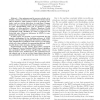Free Online Productivity Tools
i2Speak
i2Symbol
i2OCR
iTex2Img
iWeb2Print
iWeb2Shot
i2Type
iPdf2Split
iPdf2Merge
i2Bopomofo
i2Arabic
i2Style
i2Image
i2PDF
iLatex2Rtf
Sci2ools
130
click to vote
IROS
2007
IEEE
2007
IEEE
Genetic MRF model optimization for real-time victim detection in search and rescue
— One primary goal in rescue robotics is to deploy a team of robots for coordinated victim search after a disaster. This requires robots to perform subtasks, such as victim detection, in real-time. Human detection by computationally cheap techniques, such as color thresholding, turn out to produce a large number of false-positives. Markov Random Fields (MRFs) can be utilized to combine the local evidence of multiple weak classifiers in order to improve the detection rate. However, inference in MRFs is computational expensive In this paper we present a novel approach for the genetic optimizing of the building process of MRF models. The genetic algorithm determines offline relevant neighborhood relations with respect to the data, which are then utilized for generating efficient MRF models from video streams during runtime. Experimental results clearly show that compared to a Support Vector Machine (SVM) based classifier, the optimized MRF models significantly reduce the false-positi...
| Added | 03 Jun 2010 |
| Updated | 03 Jun 2010 |
| Type | Conference |
| Year | 2007 |
| Where | IROS |
| Authors | Alexander Kleiner, Rainer Kümmerle |
Comments (0)

